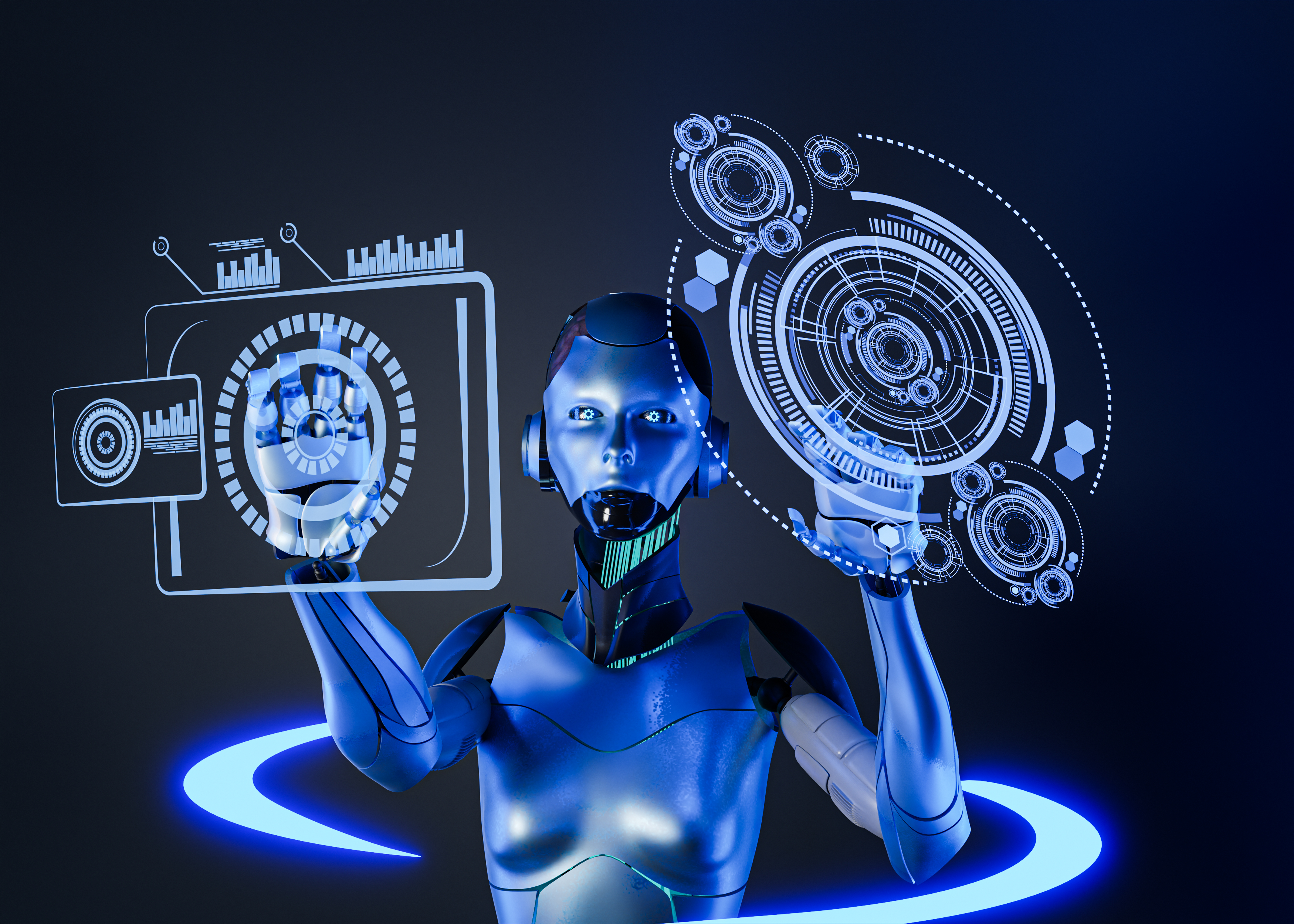
Ai And Digital Marketing In 2024
Artificial intelligence (AI) has fundamentally reshaped digital marketing in recent years. Its integration has gone from a futuristic ideal to a practical necessity for agencies looking to stay competitive. Today, the synergy between AI and marketing allows companies, especially marketing agencies, to manage processes in-house that previously required specialized resources or significant time investments. From streamlining workflows to optimizing content and artificial intelligence advertising, AI’s capabilities in digital marketing and AI provide marketing agencies with tools for a new era of efficiency and effectiveness.
How AI is Powering Digital Marketing Strategies in 2024
1. Advanced Content Personalization with AI
One of the most profound ways AI and content marketing are transforming customer experiences is through content personalization. AI algorithms can analyze vast datasets to predict customer preferences, allowing brands to create personalized content for each user. For instance, digital marketing and AI tools can track user behavior across multiple platforms, from websites to social media. This tracking provides insights into what resonates with specific audiences, enabling marketers to deliver tailored messages.
Personalized content enhances user experience, building stronger connections with consumers. As personalization becomes more sophisticated, AI-powered recommendation engines suggest content, products, and even timing to engage customers at optimal points in their journey. This is particularly effective in artificial intelligence advertising, where AI-driven algorithms target ads based on real-time user data, increasing engagement and conversion rates. Learn why you need to look into content personalization.
2. AI-Powered Short-Form Video Creation and Marketing
In 2024, short-form video content continues to be a primary driver of engagement across platforms like TikTok, Instagram Reels, and YouTube Shorts. This trend has made AI for marketing an invaluable tool in producing video content efficiently. AI-powered tools can now automate video editing, add subtitles, and even create short clips from longer content pieces, significantly reducing production time and cost.
Moreover, AI can analyze audience engagement with these videos to inform future content strategies. By identifying patterns in user behavior, such as what types of videos garner the most attention or how long viewers watch, AI and marketing teams can adjust their tactics for better reach. As short-form video content dominates social media feeds, AI is helping marketers stay relevant by creating content that resonates with audiences at a rapid pace.
3. AI-Driven Analytics and Predictive Insights
Data analysis has always been a cornerstone of digital marketing, but the capabilities of AI and digital marketing now extend far beyond traditional analytics. AI can process vast amounts of data in real time, revealing insights that humans might miss. Predictive analytics powered by AI for marketing enables brands to anticipate customer needs, optimize pricing strategies, and even predict which products are likely to sell out during a campaign.
For example, artificial intelligence advertising systems can adjust ad bids and budgets automatically, targeting the right audiences based on predictive patterns rather than historical data alone. This level of automation and precision allows brands to maximize their return on investment (ROI) while minimizing wasteful spending. Predictive analytics can also help identify emerging trends, allowing companies to stay ahead of competitors in a fast-evolving market.
How AI Empowers In-House Marketing Processes in 2024
1. Automating Routine Tasks and Enhancing Efficiency
One of the greatest benefits of AI and digital marketing for agencies is the automation of routine tasks that often consume time and resources. With AI-powered automation tools, agencies can manage tasks like scheduling posts, sending out personalized emails, and analyzing campaign performance without significant manual intervention. For example, AI-powered CRM systems can autonomously track customer interactions, flag potential leads, and even create targeted follow-up messages—all in real time.
This streamlined approach allows marketing teams to focus on high-level strategies, creativity, and client relations, rather than getting bogged down by administrative work. AI for marketing has become essential for agencies aiming to improve productivity and reduce costs, enabling them to manage complex campaigns internally without the need to outsource or hire large support teams.
2. Optimizing Content Creation and Management
With AI and content marketing tools, marketing agencies are now able to create, manage, and optimize content much more efficiently. For example, AI-powered copywriting tools can generate content ideas, write initial drafts, and even suggest SEO-friendly headlines. This allows content creators to focus on refining and tailoring content for their target audience rather than starting from scratch.
Additionally, AI can track content performance across channels, helping agencies see what resonates most with audiences. This data-driven feedback loop enables teams to adjust their strategies quickly and effectively, ensuring that clients receive relevant and engaging content. By using digital marketing and AI to handle a significant portion of the content creation process, agencies can manage more clients and produce quality content at a faster pace.
3. AI-Driven Short-Form Video Creation
With the increasing popularity of platforms like TikTok, Instagram Reels, and YouTube Shorts, short-form video content has become a major focus for agencies. Traditionally, video production required substantial resources, but AI and marketing innovations have democratized this process. AI-driven tools can now automate video editing, add effects, and even generate subtitles, making high-quality video content accessible to agencies of all sizes.
These tools can also analyze video performance in real time, providing insights into viewer behavior and engagement. This feedback allows agencies to tweak content quickly to improve reach and impact, ensuring clients receive the most effective marketing strategies possible. With AI for marketing, agencies can now handle short-form video content production and optimization in-house, saving both time and money while achieving powerful results. Learn more about how short form video content is used to grab attention of users.
4. AI-Enhanced Data Analysis and Predictive Insights
Data analysis has long been a cornerstone of successful marketing campaigns, but the ability of AI and digital marketing to process complex datasets has taken this to a new level. Agencies can now leverage AI to track and analyze customer data, revealing insights that were previously hidden or difficult to discern. For example, AI for marketing can detect emerging trends and predict customer behaviors, helping agencies make proactive adjustments to campaigns.
Moreover, artificial intelligence advertising platforms provide real-time analytics that adjust ad placements and budgets based on data patterns. This level of in-depth data analysis and predictive capabilities enables agencies to handle comprehensive marketing strategies in-house, without needing external analytical services. By identifying high-performing segments and adjusting campaigns in real time, agencies can maximize results for clients and enhance ROI without overspending.
5. Streamlined Campaign Management and Optimization
Campaign management involves numerous moving parts, from planning and execution to monitoring and adjustments. Traditionally, many agencies outsourced certain aspects of campaign management, particularly those requiring specialized skills. However, with digital marketing and AI tools, agencies can now manage end-to-end campaigns with greater precision and fewer external resources.
For example, AI and marketing platforms provide tools for automated A/B testing, which can compare multiple versions of ads, emails, and landing pages to determine which performs best. These insights allow agencies to refine strategies mid-campaign, optimizing reach and engagement based on real-time data. By taking advantage of AI and digital marketing for campaign management, agencies reduce the need for external oversight and control every aspect of the campaign in-house.
AI-Driven Advertising: In-House Precision Targeting
Artificial intelligence advertising has transformed how agencies approach ad targeting. AI algorithms can segment audiences with extraordinary precision, identifying potential customers based on their behaviors, preferences, and even lifestyle attributes. For example, AI and marketing tools can optimize ad placements, ensuring that each ad reaches the audience most likely to engage and convert.
This ability to conduct sophisticated audience targeting in-house means agencies can provide highly customized advertising strategies without outsourcing. By keeping this process internal, agencies have full control over ad adjustments and can offer clients a more agile, responsive approach to advertising. Additionally, with AI continually learning from campaign data, agencies can further refine targeting parameters to improve results over time.
The Future of AI and In-House Digital Marketing for Agencies in 2024
In 2024, the convergence of AI and digital marketing will only deepen, providing agencies with even more tools to handle campaigns in-house. This shift not only reduces reliance on third-party vendors but also allows agencies to innovate, experiment, and implement strategies with greater agility. With the power of AI for marketing, agencies can bring high-quality, data-driven solutions directly to clients, maintaining control over every step of the process.
However, as AI becomes more embedded in digital marketing and AI strategies, agencies must also address challenges like data privacy, ethical AI use, and transparency. Adhering to regulatory standards and maintaining ethical practices will be crucial in building and sustaining consumer trust.
Conclusion
In conclusion, AI and marketing have become indispensable for agencies looking to streamline their processes and manage more tasks in-house. With artificial intelligence advertising, predictive analytics, and content personalization tools, agencies can offer end-to-end solutions without relying heavily on external vendors. As digital marketing and AI continue to evolve, agencies are better equipped to provide high-quality, customized services at a competitive pace.
For agencies in 2024, adopting AI is no longer an option; it’s a fundamental requirement for staying relevant in a rapidly advancing digital landscape. By embracing these AI-powered tools, marketing agencies can achieve higher efficiency, improved client satisfaction, and measurable success in every campaign.



